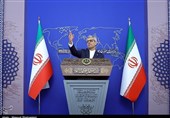Immigrant Vote Crucial to Scotland Independence
TEHRAN (Tasnim) - On the south side of Glasgow, in the heartland of Scotland's Asian community, support for independence from the United Kingdom is strong as Thursday's referendum nears.
Colorful displays of Yes posters outnumber those backing the Better Together campaign. Talk on the street is of opportunity and a chance to create a fairer country more welcoming to immigrants.
Glasgow is Scotland's largest city, and its most ethnically diverse. Over the last 60 years an influx of Indians, Pakistanis, Bengalis, Chinese, Italians, Poles and others have created new communities which, because of their relative small size, have had to merge with the culture of their adopted country.
Across Scotland, there are some 140,000 people who class themselves as Asian Scots, along with around 30,000 Africans, 7,000 from the Caribbean, 55,000 Poles and over 160,000 other non-British EU Citizens eligible to vote in the landmark referendum.
These "New Scots" represent more than 4 percent of the population and with the polls putting both sides of the debate neck-and-neck just days before Thursday's vote, their views could be critical, AP reported.
Research by the Center on Dynamics of Ethnicity, based at Glasgow University, recently found that minority groups in Scotland are more likely to claim a Scottish identity when compared to minority groups in England deciding whether to choose an English identity. Overall 94 percent of those from ethnic communities born in Scotland identify as being Scottish rather than British — likely giving independence forces a boost.
For many ethnic minority voters, contrasting attitudes on immigration between Scotland and the rest of the UK are a prominent factor in their decision making. Scotland, with a population of around just 5 million, wants a more open policy to attract people and talent, while the British government is under political pressure to curb immigration.
However, many European Union nationals living in Scotland fear they will have problems if an independent Scotland is refused entry into the EU.
Many are also concerned that a referendum on EU membership promised by Prime Minister David Cameron after the 2015 general election — assuming he retains power — could result in Scotland being forced to leave the EU if the rest of the UK votes that way.






